Immigration
May Day rallies are planned across the country urging Congress to ease the nation's immigration laws. Although the rallies won't be as large as demonstrations in 2006 and 2007, groups have focused heavily on calling and writing congressional representatives. Activists feel more their ongoing targeted campaigns at congresional representatives and demonstrations are the most effective way to achieve immigration reform. The Associated Press reports:
A phone blitz targeting Republican U.S. Sen. Orrin Hatch produced 100 calls a day to the Utah lawmaker's office last week, said Jeff Parcher, communications director for the Center for Community Change, which works on technology-driven advocacy for the network of groups. After Hatch was quoted Sunday in The Salt Lake Tribune saying immigration reform couldn't wait, a message went out to call his office with thanks.
Read more here.
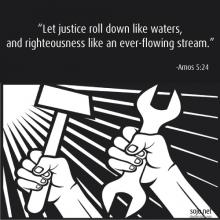
Editor's Note: The following is the text of an invocation being given at the May Day Rally in Madison, Wis.
When we gather at a place like our State Capitol, there are people here from all sorts of religious and non-religious backgrounds.
There are Christians and Jews, Muslims and Buddhists, Hindus and and Bahai, Humanists and people who are pretty sure they believe something, but don’t know exactly how the heck to describe it.
What connects us all this day is a spirit of hospitality, a spirit of compassion and a spirit of justice.
At their worst, religious and other beliefs can isolate us in little camps where we see outsiders as threats. At their best, they call us to hospitality, not only to those we know, but to the strangers in our midst – those who come from other places, speak other languages, seek a new life. At their best, they call us to embrace those who seek to be part of our community.

If Congress passes immigration reform, much of the credit will be given to the broad and diverse voices that have lined up in support of fixing our nation’s broken immigration system. Both the labor and business community have been instrumental in moving legislation forward, while the evangelical community’s call to “welcome the stranger” has received significant attention by politicians and the media. The coalition of supporters continues to grow, as last week the Sierra Club, the oldest environmental organization in the country, announced its support for immigration reform.
Why would an environmental organization get involved with immigration reform? What could they possibly have at stake?
A lot.
Today the Supreme Court refused to consider an appeal of an Alabama immigration law that allowed law enforcement to arrest people who hid or helped transport illegal immigrants. USA Today reports:
By refusing to reconsider the case, the high court will let stand a federal appeals court's ruling last year that went against Alabama. That law garnered attention for another provision, thrown out by an appeals court, that targeted public school students in the country illegally.
Read more here.

The U.S.-Mexico border is currently patrolled by 10 Predator surveillance drones. The immigration reform bill introduced in the Senate would increase that in order to provide constant coverage. ABC/Univision reported:
“Unmanned aerial vehicles, or drones, could soon be patrolling the United States border with Mexico 24 hours a day, seven days a week. That's what the major immigration reform bill introduced last week by a bipartisan group of senators proposes.
“The goal: 'effective control' of the border. Under the bill, no immigrant granted provisional legal status would be eligible to apply for a Green Card until the Department of Homeland Security shows it's made substantial progress toward that goal. Border hawks want the pathway to citizenship more firmly tied to border security success.”
But, as Common Dreams reports:
“As the new immigration reform bill moving through the US Senate puts aerial drones at the center of a beefed-up militarized approach to border security, a new report shows that the existing drone-border program has proved an 'inefficient, costly and absurd approach' to monitoring the border or enforcing current immigration laws.”
The report was produced by the Center for International Policy, you can read it at Drones over the Homeland.
Leading U.S. Catholic bishops on Monday denounced efforts to use the Boston Marathon bombings to derail the push for immigration reform, saying it is wrong to brand all immigrants as dangerous and that a revamped system would in fact make Americans safer.
“Opponents of immigration … will seize on anything, and when you’ve got something as vivid and as recent as the tragedy in Boston it puts another arrow in their quiver,” New York Cardinal Timothy Dolan, president of the U.S. Conference of Catholic Bishops, told reporters.
“To label a whole group of people – namely, the vast population of hard-working, reliable, virtuous immigrants – to label them, to demean them because of the vicious, tragic actions of two people is just ridiculous,” he said. “Illogical. Unfair. Unjust.”
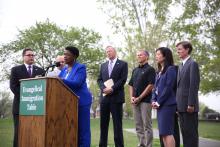
Hours after Senate Gang of Eight’s immigration bill dropped early Wednesday, evangelical leaders from across the country gathered at the Capitol to raise their voices for comprehensive immigration reform.
In the last two years, evangelicals have been a growing voice in the debate over immigration reform, hoping their votes — traditionally a bastion of conservative politics but recently broadening their engagement to gun violence prevention, poverty, and climate change — hold clout on the Hill when it comes to immigration reform.
The Evangelical Immigration Table, a coalition of evangelical leaders from across the political spectrum, gathered hundreds of people from 25 states for a day of action on the Hill. At the morning press conference, the Table representatives did not explicitly endorse or critique the Senate’s new bill. Instead, leaders pledged to "come alongside" any bill that supported their unified set of principals, namely immigration reform that: protects the unity of the immediate family; respects the rule of law; guarantees national security borders; and establishes a path toward legal status and/or citizenship for those who qualify.

The common good is not only about politics. The common good is about life and how we live it. It is ultimately about how we are all connected. It is about how our love or lack of love affects our families, our neighbors, our communities, our cities, our nation, and our world.
The common good is about personal brokenness. Have we taken the time to let Jesus come in and heal the wounds that distort the image of God within of us — wounds that drive daughters and sons, mothers and fathers to self-destruction? Have we taken the time to let the Great Physician heal the personal wounds that break families and friendships, slicing the central fabric of society? We are all connected.
Many of the great Christian thinkers throughout our history have seen that goodness, by its very nature, is diffusive of itself. That is, goodness is such that it pours itself out. To the degree to which I am good, I share that goodness with others to the same degree. The doctrine of creation is often seen in this light. God’s goodness is perfect and as such it is poured out naturally and freely to God’s creation. Goodness, in a word, is generous.
While thinking about immigration, I began to ask myself what this feature of goodness implies. How does the fact that goodness is diffusive of itself relate to my treatment of others, and especially to my treatment of those who, through no fault of their own, simply lack some of the basic goods that I have in abundance? Well, the answer seemed fairly obvious. My basic disposition toward my things and even myself must be one of generosity. Now we can argue over the fine points regarding this or that governmental policy, but we must recognize what we have and cultivate a deep desire to share it with others. Sharing our wealth, our food, our clothing is, I think, merely the first step towards becoming generous.
Thousands of people flooded the National Mall on Wednesday to call on Congress for commonsense immigration reform that includes a roadmap to earned citizenship for the estimated 11 million undocumented immigrants living in the United States.
Coupled with a day of lobbying on Capitol Hill and sibling rallies across the country, Wednesday’s was one of the biggest immigration rallies to date. Sponsored by the Service Employee International Union, Casa de Maryland, the NAACP, and more, the rally began with an interfaith prayer service and featured the voices of faith leaders, including UMC Bishop of Los Angeles Minerva Carcaño, Director of Religious Action Center for Reform Judaism Rabbi David Saperstein, Director Hispanic Diocese of Arlington Padre Jose Eugenio Hoyos, and Islamic Center of Maryland Imam Jamil Dasti.

At the Full Frame Film Festival in Durham last week, I saw Marco Williams’ new documentary, The Undocumented, which tracks migrants as they hike into the United States across the border between Mexico and Arizona, trying to escape the detection of border patrol agents, and trying to survive the deadly heat of the Sonoran desert.
The documentary follows a young man, Marcos Hernandez, as he tries to find his father, Francisco, who was last seen in the desert walking for days in the 120-degree summer heat. Francisco left their home in Mexico with a coyote — man he paid $2,000 to lead him across the border — to make enough money to pay for his son’s expensive dialysis treatments. But he never called; he never returned. The coyote reported that he left Francisco in the desert because he was sick and couldn’t keep up with the other migrants in the group. Marcos fears the worst — that his father died of dehydration, of heat exhaustion. But to confirm the death he has to find the body.
The filmmaker focuses on the morgue in Tucson, Ariz., where the medical examiner investigates human remains, looking for clues that would help identify the dead in order to return whatever is left to family members and friends, to provide some kind of closure, to honor the dead with a burial.
In the film, Marcos won’t believe his dad is dead until he can see his dead body, or whatever is left of his body — a skull, teeth, his rib cage. He will not believe unless he can see.
“Unless I see the mark of the nails in his hands, and put my finger in the mark of the nails and my hand in his side, I will not believe” (John 20:25). That’s what Thomas says to the other disciples about the resurrected Jesus; and what Thomas says about needing to see the body reminds me of the story of Marcos, about the need to see in order to believe.

As Christians around the world gathered for Good Friday and Resurrection Sunday celebrations last weekend, I have reflected a great deal about the connection between the suffering and passion of Christ and the plight of the undocumented in our nation.
This past year, an amazing surge of activity and concern has emerged among believers in general, and evangelicals in particular focused on passing a new immigration policy in our country. This development is quite a surprise and change. In fact, 10 years ago it was almost impossible to find a recognized evangelical leader who was knowledgeable about immigration, let alone one who was willing to speak out on this issue.
At the core of why evangelicals have made such a dramatic change of heart is the reading of Scripture. While it is impossible to ignore that there are 92 references in Scripture where the word, 'ger' is used, speaking about the stranger in our land and our treatment of these individuals, it is not one single verse but the entire revelation of Scripture that points us towards our responsibility to love the most vulnerable people in our society.
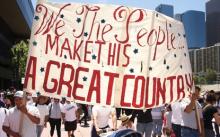
The Associated Press announced Tuesday it is dropping the term "illegal immigrant" from its Stylebook. Citing concern for “labeling people, instead of behavior,” AP’s Senior Vice President and Executive Editor, Kathleen Carroll, wrote, “The Stylebook no longer sanctions the term 'illegal immigrant' or the use of 'illegal' to describe a person. ...'Illegal' should describe only an action.”
This change is a huge win for those working on immigration reform, including the staff at Sojourners. Last fall, Sojourners joined many others in calling on the Associated Press to change the term.
“The media’s usage of the word 'illegal' is dehumanizing and distorting," wrote Sojourners Immigration Campaigns Fellow Ivone Guillen in October. "When used by journalists, it introduces a bias into their reporting and risks prejudicing the reader against the needs, concerns, and humanity of immigrant communities, regardless of their documentation status.”

The night was cold and dark as the family approached the border. Ahead of them were miles of desert that would test their will and drain their stamina. What they were doing defied the law. But they were a family, and families will do anything for the sake of their children.
The law they defied was that of Herod. The family: Joseph, Mary and the Christ-child.
As Christians prepare to celebrate Easter, let us remember that the life that ended on the cross began on the road. This Easter, let us remember that Christ the Savior began his life as an immigrant, fleeing the land where he was born to escape Herod’s wrath.
Easter is a holiday of new beginnings. It welcomes a new season. It is a time to start fresh. At the heart of Easter is a magnificent reservoir of grace. Of this holiday, Katherine Lee Bates reflected, “It is the hour to rend thy chains, the blossom time of souls.” Easter is a time to set people free, fix things that are broken, watch souls blossom — all for glory of the risen Christ.
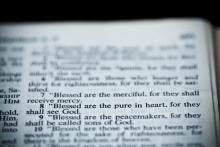
“Blessed are the peacemakers, for they will be called children of God.
“Blessed are those who are persecuted for righteousness’ sake, for theirs is the kingdom of heaven.
“Blessed are you when people revile you and persecute you and utter all kinds of evil against you falsely on my account. Rejoice and be glad, for your reward is great in heaven, for in the same way they persecuted the prophets who were before you.”
Social Justice Reflection:
Jesus was a peacemaking, blessed child of God, but he also was an “other.” Reviled and persecuted, he was the paperless son of displaced immigrant parents. The prophetic iconoclast. That guy who hung out with those people, the type most modern leaders would not associate with, except for a photo opportunity at a Thanksgiving Day soup kitchen. Let us remember on Sunday when we celebrate his resurrection, that Jesus was crucified because he was an outsider whose way of doing things scared and angered the powers-that-be.
We have become a nation that loves to “other” people. We point out their differences as reasons they cannot be trusted, as evidence that they take too much from the rest of us or threaten our well-being. We have lengthy, bitter debates about allegiance and legitimacy, and we reject those who do not meet our standards. We know who belongs, and the others need to clear out and leave us alone with our worldly possessions, our rules, and our way of doing things.
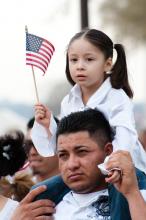
More than six in ten Americans support a pathway to citizenship for immigrants, a survey out today from the Public Religion Research Institute finds.
63 percent of Americans support a path to citizenship, including a majority of Republicans, Independents, and Democrats, and majorities among every major religious group.
“Proponents of immigration reform are unlikely to find a more favorable moment [in the political climate] than now,” said EJ Dionne, Senior Fellow at the Brookings Institution and a columnist at the Washington Post, as part of a survey panel this morning.
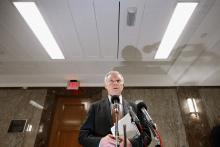
The momentum for immigration reform is building across the country, but leaders in Washington are often the last to realize the seismic shifts taking place. The most recent example is when Alabama Sen. Jeff Sessions made the claim that there is no “moral or legal responsibility to reward somebody who entered the country [without documentation].”
No moral responsibility? Many Christians believe otherwise.

Immigrants are a blessing, not a curse. They are assets, not deficits. I have learned this the hard way after seven years working with the New York City New Sanctuary Movement. We have accompanied 67 people on the verge of detention or deportation, and we have lost only three of them.
These people are restaurant owners — employers. Some run small high tech start-ups; others raise children on their own, grouping with other parents to take care of them. They live under the constant fear of disruption to their lives and constant trepidation about whether their children will be separated from them. Many have been picked up for small offenses, like traffic violations and gone to jail only to luckily be released. But they have still have shown resilient courage, that miracle of guts that keeps them going inside the constant fear and the constant harassment. Immigrants are spiritual and economic blessings, not curses. They are assets, not deficits.
For the past 19 years I’ve worked and lived in inner city East Dallas among very poor individuals and families. CitySquare, the faith-based non-profit that I lead, last year served more than 50,000 different individuals. We work hand-in-hand with low-income people to see life improved and turned toward real, lasting, legitimate opportunity. Our day-to-day work involves hunger relief and nutrition improvement, health care delivery, wellness programs, legal services, housing options, workforce training and job placement, public policy initiatives, and community organizing. It has been in this dynamic context that we’ve become very involved in advocating for comprehensive immigration reform.
Over half of our friends and neighbors who come through our doors seeking a better life are undocumented residents. Since our entire approach to the community is based on building strong, personal connections and relationships across and beyond the typical barriers of income, gender, race, and religion, we’ve become very aware of the plight, the needs, and the rights of our immigrant friends. Tens of thousands of residents of the Dallas metro area need the relief that comprehensive immigration reform promises.